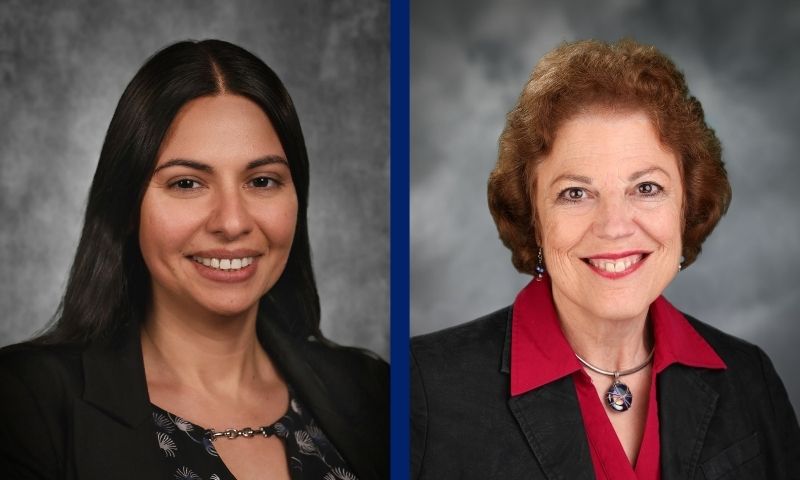Nursing Faculty Launch Pilot Projects for Cancer Survivors and People Living with HIV
Dr. Marissa Abram and Dr. Sophia Smith earned pilot funding for studies aimed at improving health outcomes for young cancer survivors and people living with HIV who use illicit substances.

The School of Nursing’s Center for Nursing Research (CNR) has awarded two faculty members with Fall 2024 pilot grants: Assistant Professor Marissa Abram and Associate Professor with Tenure Sophia Smith.
The CNR Pilot Funding Program, established in 2017, supports pilot projects for up to 18 months with a budget of up to $30,000.
The purpose of this year’s grants was to enable researchers to acquire preliminary data for a new submission or resubmission of a federal proposal (R21, R34, RO1, UO1). The call for proposals prioritized health equity and social determinants of health, seeking projects and nurse-led interventions or models of care related to climate change and health, community engaged research in rural settings, or other areas.
“The CNR is very proud to support the studies of Drs. Smith and Abram with a Fall 2024 Pilot Award,” said Sharron Docherty, Vice Dean for Research and Associate Professor. “Supporting the work of these two investigators is an example of how the CNR is providing resources to further develop faculty research in community settings that will aim to advance health equity and mitigate the harmful effects of social determinants of health.
“Identifying Effective Strategies for Sustained Viral Suppression (SVS) among Individuals with HIV Who Use Illicit Substances”
Marissa Abram, PhD, PMHNP-BC, CARN-AP, FIAAN, and her team have begun a study entitled “Identifying Effective Strategies for Sustained Viral Suppression (SVS) among Individuals with HIV Who Use Illicit Substances.” Building on 20 years of working with substance use disorders, Dr. Abram is focusing this study on closing treatment gaps for people living with HIV who use illicit substances.
“About 10% of people with substance abuse disorders access treatment,” said Dr. Abram. “Once we start looking at comorbidities, like HIV, we especially need to think about evidence-based, patient-centered interventions that both engage and meet the needs of these individuals.”
Dr. Abram says that there has been progress regarding illicit substances over the years, with the opioid crisis sparking a public health response that emphasizes harm reduction over a punitive approach. Likewise, Dr. Abram says that medications to reduce the risk of getting HIV, like pre-exposure prophylaxis (PrEP), offer progress-oriented strategies towards ending the HIV epidemic; however, there is still a need to focus interventions to support sustained viral suppression.
“Individuals who have HIV and use substances experience multi-layered health inequities and need evidence-based care models that promote their health and wellbeing,” said Dr. Abram. “I’m using an integrated framework that examines individual-level, psychosocial decision-making factors while also considering the broader social determinants of health, or contextual and ecological factors that might affect an individual.”
Dr. Abram and her team will engage in primarily qualitative work, collecting individual perspectives on barriers to access and holding focus group interviews with community providers to identify potential solutions to influence antiretroviral treatment uptake and sustained viral suppression. They will partner with a Wake County infectious disease clinic.
“The wonderful thing about these pilot opportunities is that you get the preliminary data needed to move these programs of research forward and to design interventions and test them,” said Dr. Abram.
“Resilience Reminders among Adolescent and Young Adult Cancer Survivors”
Sophia Smith, PhD, MSW, FAOSW, and her team are conducting a study on “Resilience Reminders among Adolescent and Young Adult Cancer Survivors,” focusing on addressing the severe psychological distress experienced by this demographic.
“These individuals face a lifetime risk of depression, anxiety, PTSD, and even suicide,” said Dr. Smith. “The transition from adolescence to young adulthood is a critical period, and cancer-related distress can reduce their quality of life, increase healthcare costs, and hinder their ability to achieve developmental milestones.”
Inspired by the success of the Pillars4Life© model among adult cancer survivors, Dr. Smith and her team have developed an application called Resilience Reminders™ (RR™). The app utilizes cognitive behavioral therapy to reduce symptoms of depression, anxiety, and PTSD among adolescents and young adults (AYA).
“Resiliency is crucial for young cancer survivors because it helps them cope with the significant psychological distress associated with their experience,” said Dr. Smith. “Building resilience can aid in managing emotional reactivity, enhancing a sense of mastery, and fostering a sense of belonging.”
The CNR-funded pilot study aims to achieve several key outcomes: evaluate the feasibility and acceptability of the app; examine the relationship between potential mediators, such as resiliency and sense of belonging, and mental health outcomes; and explore the mechanisms through which the app impacts AYA and parent experiences.
“These interventions and outcomes will provide valuable insights into improving mental health support for AYA cancer survivors, ultimately enhancing their quality of life and reducing long-term healthcare costs,” said Dr. Smith.